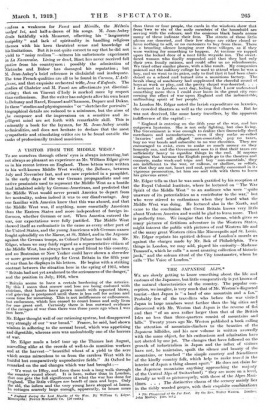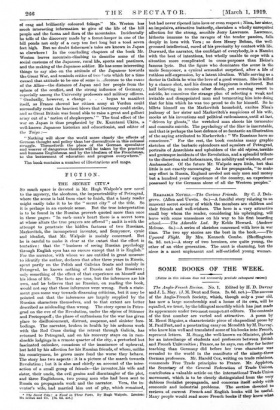THE JAPANESE ALPS.*
Ws are slowly getting to know something about the life mud customs of the Japanese, but little comparatively is yet known of the natural characteristics of the country. The popular con- ception, we imagine, is very much that of Mr. Weston's disgusted tourist—that Japan is " a land of one mountain and a fan." Probably few of the travellers who before the war visited Japan in largo numbers went farther than the big cities and discovered with Mr. Weston that Japan is the reverse of fiat and that " of an area rather larger than that of the British Isles no less than three-quarters consist of mountains and hills." Twenty years ago Mr. Weston published a book calling the attention of mountain-climbers to the beauties of the Japanese hillsides, and his new volume is written avowedly with the same object, for his enthusiasm and admiration have not abated by ono jot. The changes that have followed on the growth of industrialism in Japan and the influx of visitors have not, he maintains, spoilt the silence and beauty of the mountains, or touched " the ample courtesy and friendliness of the kindly country folk, which help to make travel in limo interior of Japan a thing almost apart," He does not claim for the Japanese mountains anything approaching the majesty of the Central Alps of Switzerland; " they are more on a level, literally as well as picturesquely, with those of the Alpes Mari- times. . . . The distinctive charm of the scenery mainly lies in the richly wooded gorges, with their exquisite combinations • The Plowerosed of the For Yee. Ur the Bev. Walter Weston. Lando et John Murray. ltd. nett) of crag and brilliantly coloured foliage." Mr. Weston has much interesting information to give of the life of the hill people and the fauna and flora of the mountains. Incidentally be tells of the discovery made by a forest-keeper in one of the hill ponds not only of a carp ton feet long but a toad seven feet high. But no doubt fishermen's tales are known in Japan as elsewhere ! In the concluding chapters of the book Mr. Weston leaves mountain.climbing to describe some of the social customs of the Japanese, rural life, sports and pastimes, and the making of the Japanese soldier. He has some interesting things to say also on the attitude of the Japanese towards the Great War, and reminds critics of two flats which for a time caused that attitude to be one of some is ..fference to the cause of the Allies—the distance of Japan and her people from the sphere of the conflict, and the strong influence of Germany, especially among the University professore and military officers. " Gradually, however, a change . . . began to manifest itself, as France showed her citizen army at Verdun could successfully resist the heaviest blows that Germany could strike, and as Great Britain was found able to raise a great and gallant army out of a ` nation of shopkeepers.' " The final effect of the war on Japan is thus prophesied by Dr. Katutami Ukita, a well-known Japanese historian and educationist, and editor of the Taiyo :—
" Nothing will show the world more clearly the effects of German thought end policy than her discomfiture in this colossal struggle. Thenceforth the place of the German speculator and weaver of dangerous theories will be taken by the practical and humane Englishman and by the idealism of the Frenchman, to the betterment of education and progress everywhere."
The book contains a number of illustrations and maps.



































 Previous page
Previous page